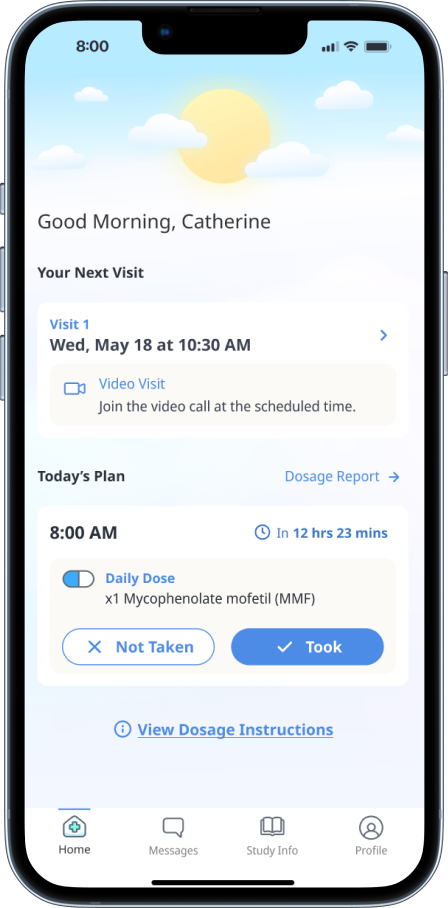Patient Mobile Apps: A Must-Have in Clinical Research
Clinical trial apps streamline trial administration and keep patients on top of their treatment.
98% of people in the United States have a cellphone of some kind. In the second quarter of 2024, around 96.2% of global users accessed the internet via mobile phones, and 94.1% of those reported doing so via smartphones. Obviously, people love their smartphones. And they love them not just because a smartphone is a convenient way to speak to people on the go. The thousands of apps available for smartphones allow people to stay in regular touch with the things that matter to them: the news, their heart rate, their bank account transactions, etc. If you can think it, there is probably an app for it.
Explore how to better equip clinical studies with streamlined, human-centric patient apps.
But when talking to clinical trial sponsors about developing smartphone apps that could keep patients on track with their clinical trials and keep trial administration streamlined, developers are hitting a wall. Why, when we know that 75% of patients prefer trials that utilize digital tools?
First, clinical trial sponsors question usage and usability, particularly in older populations. And second, they worry that their budgets and their trial sites won't support mobile app development, not to mention the stress perceived in making the app regulatory compliant. In other words, the hurdles seem too high for clinical sponsors to get on board.
This blog aims to dispel these myths and show how patient apps for clinical studies are a must have that will increase engagement, lower costs and streamline management and administration.
Older Patients and Health-Related Smartphone App Usage
While historically, older adults were less likely to embrace new technology, trends are shifting. Many older patients are now using smartphones and mobile apps to manage their health. According to a 2021 Pew Research Center report, 61% of adults aged 65 and older own a smartphone, up from just 13% in 2012, and according to a 2024 AARP survey, 71% of people aged 50 and older report using a health-related app on their smartphones or tablets. These apps help them track everything from fitness and medication adherence to appointments and test results.
Rather than being concerned about the willingness of usage among older patients, clinical trial sponsors should be asking: how can we build apps that older adults find useful and easy to use?
The answer is human-centric design that tailors to the needs of older adults. Simple innovations like designing larger buttons and clear topography for the visually impaired make a huge difference, while proactively integrating patient transportation solutions to overcome mobility barriers becomes a relief for some patients and providing medication and appointment reminders boost adoption across the board. Human-centered solutions like these ensure that the technology enhances the lives of older patients and keeps them compliant across the entire spectrum.
The Cost-Benefit of Apps in Clinical Studies

Even while mobile health tech has become the new normal for patients of all ages since the pandemic, apps for clinical trials are still often viewed as “nice to have” rather than an essential part of the process, an opinion that goes against everything we know about mobile health app adoption.
In many cases, it is believed that app integration is limited to high-budget studies because it is seen as an additional cost rather than a necessary investment in patient engagement. Of course, better patient engagement means better patient retention rates, which can reduce costs and enhance study outcomes, negating that theory.
In fact, clinical patient apps can save costs in many places along the trial journey. For example:
- Patient apps allow for real-time, automated data collection. As patients log their symptoms, medication adherence, or biometric data (e.g., blood pressure, heart rate) directly into the app, the data is instantly uploaded to the trial database. Researchers can monitor the progress of the trial remotely, identifying potential issues in real-time and addressing them more quickly, which can prevent delays or costly mistakes.
- Well-designed patient apps can easily scale to accommodate larger numbers of participants or multiple sites without a proportional increase in administrative burden. As more trials incorporate digital tools, scaling becomes simpler and more cost-effective.
- Patient apps can help with regulatory compliance through real-time data collection and monitoring, including patient consent and documentation, protocol adherence, data security, real-time compliance reporting, subject safety reporting,and centralized data management. However, sponsors remain responsible for ensuring compliance with the applicable data privacy regulations and the Good Clinical Practice. It is also worth noting that a patient app can be classified as a Software as a Medical Device if it influences patient diagnosis, treatment, or clinical decision-making. In this case, additional regulatory approvals may be required.
Choosing the Right Patient App
The truth is, in no time, clinical trial apps will be standard core clinical trial technology contributing to success for sites and patients at every trial. For trial sponsors, choosing the right app developer for your trial will be the biggest concern.
In our minds, the best approach is to invest in a single unified, configurable app that eliminates the need for building custom apps from scratch. This reduces timeline delays and cost burden. You want app developers who also work closely with regulatory bodies to keep apps compliant with evolving standards without having to redevelop each time rules change. Sponsors should also negotiate clear contracts with the app developers to define ownership of IP, patient data, liability in case of malfunctions and specific oversight over the process of sensitive data. Ultimately, we want patients to stay on course with their treatment and researchers to have a streamlined flow of data to gauge evolving trail results without the cost of complicated tech slowing trial timelines.
Are you interested in equipping your clinical studies with streamlined, human-centric patient apps every day. Contact us at Syneos Health.
Contributors
Faryar Ghaemi
Assoc Director, Product Management | Tech Solutions Tech Delivery Center




